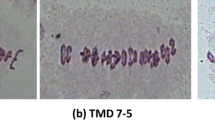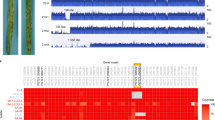Abstract
SINCE 1950, epidemics have been reported of a rust disease of maize due to Puccinia polysora Underw. which is new to West Africa1. The identity of this rust has been confirmed by Stanton and Cammack2 by the discovery of the teleutospore phase in Nigeria which agrees with the description by Cummins3.
This is a preview of subscription content, access via your institution
Access options
Subscribe to this journal
Receive 51 print issues and online access
$199.00 per year
only $3.90 per issue
Buy this article
- Purchase on Springer Link
- Instant access to full article PDF
Prices may be subject to local taxes which are calculated during checkout
Similar content being viewed by others
References
Rhind, D., Waterston, J. M., and Deighton, F. C., Nature, 169, 631 (1952).
Stanton, W. R., and Cammack, R. H. (in the press).
Cummins, G. B., Phytopath., 31, 856 (1941).
Manners, J. G., Ann. App. Biol., 37, 187 (1950).
Vavilov, N. L., “The Origin, Variation, Immunity and Breeding of Cultivated Plants” (1950).
Hayes, H. K., and Immer, F. R., “Methods of Plant Breeding” (New York, 1940).
Author information
Authors and Affiliations
Rights and permissions
About this article
Cite this article
STANTON, W., CAMMACK, R. Resistance to the Maize Rust, Puccinia polysora Underw.. Nature 172, 505–506 (1953). https://doi.org/10.1038/172505b0
Issue Date:
DOI: https://doi.org/10.1038/172505b0
This article is cited by
-
Cloning southern corn rust resistant gene RppK and its cognate gene AvrRppK from Puccinia polysora
Nature Communications (2022)
-
Resistance in maize to the tropical American rust fungus, puccinia polysora underw.
Heredity (1957)
-
Resistance to the Maize Rust, Puccinia polysora
Nature (1954)
Comments
By submitting a comment you agree to abide by our Terms and Community Guidelines. If you find something abusive or that does not comply with our terms or guidelines please flag it as inappropriate.



